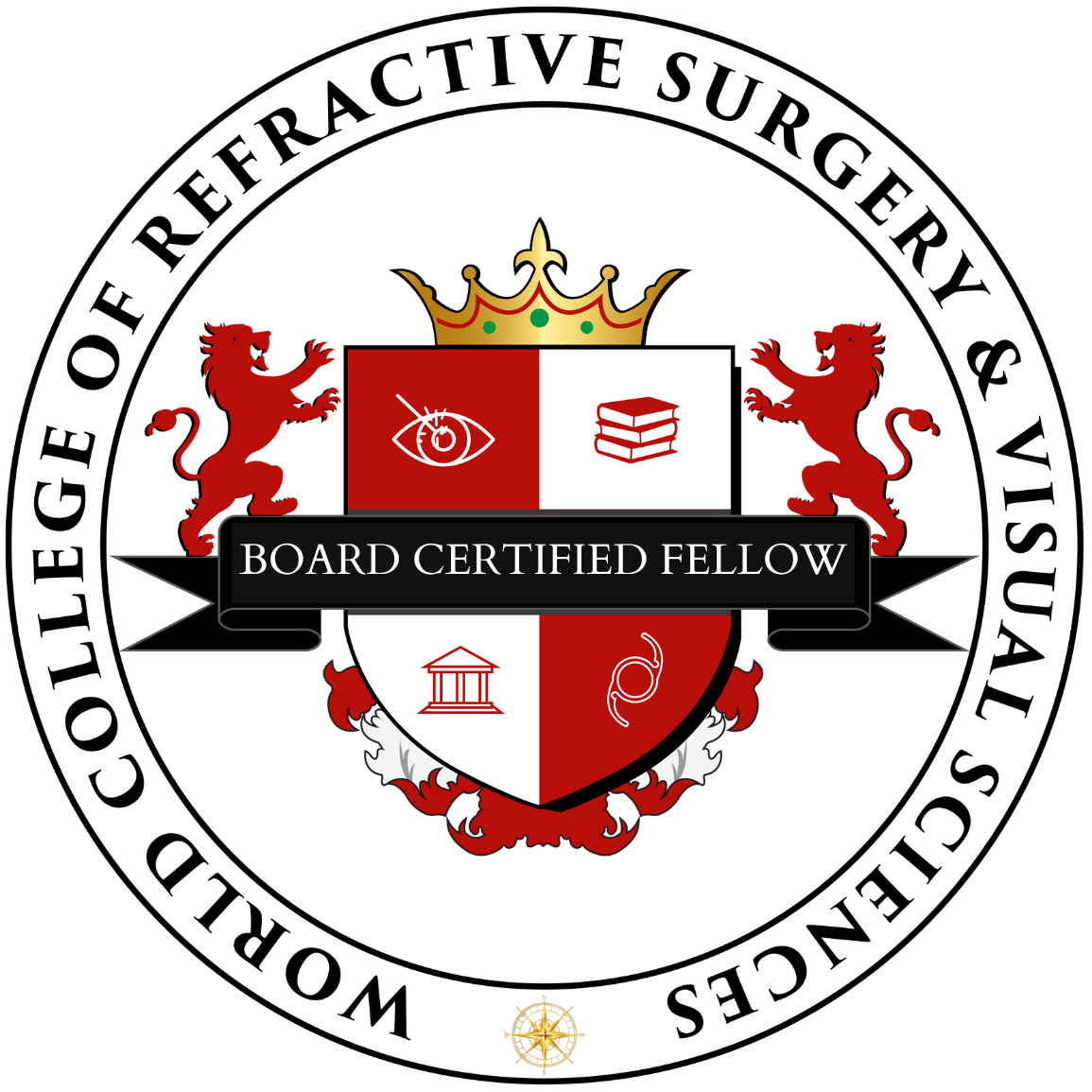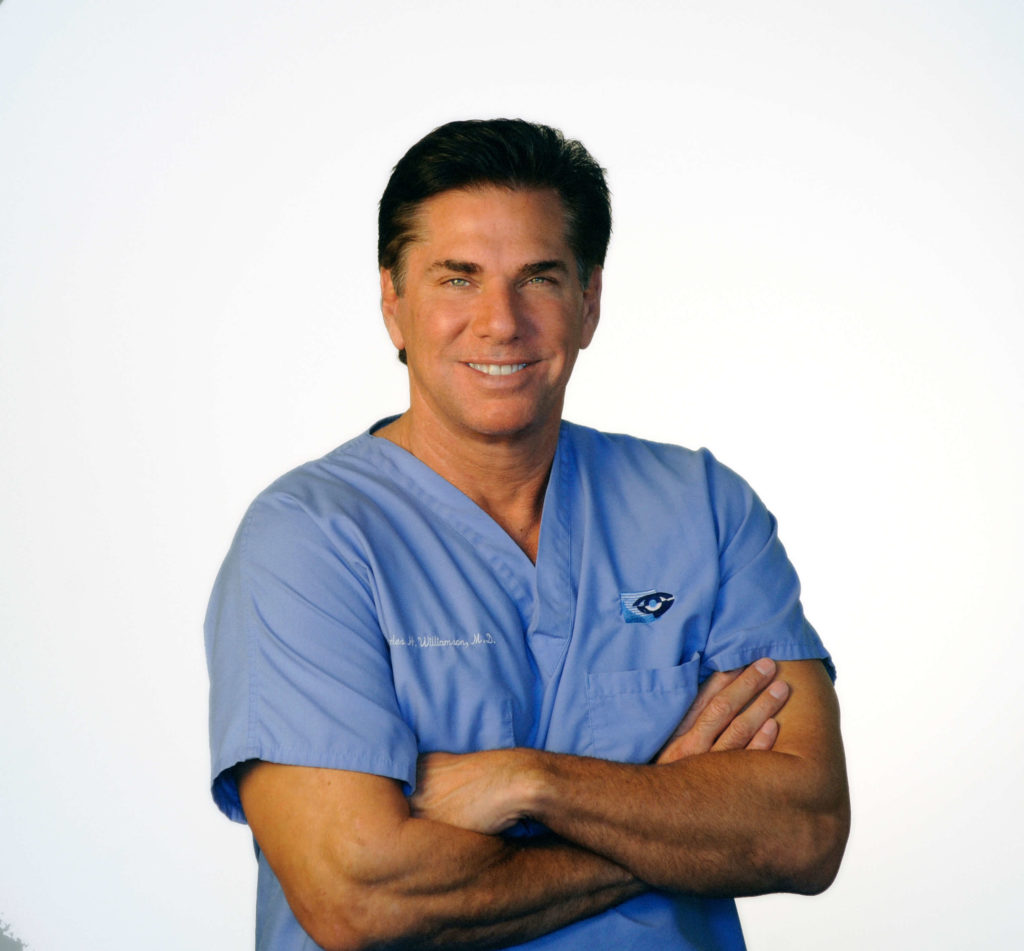The World College of Refractive Surgery & Visual Sciences (WCRS) represents Refractive Surgery as a standalone medical specialty. Its operational goals are to provide oversight, evaluation, and credentialing through the accreditation of education and training as well as certification of ophthalmologists worldwide who wish to become board-certified in Refractive Surgery.
The WCRS supports the teaching, promotion, and expansion of the specialty and science of Refractive Surgery on a global level to increase the availability of trained Refractive Surgeons for the benefit of doctors and their patients.
The WCRS as a public benefit company will work through its affiliated foundation the Visual Freedom Foundation (VFF) for social impact and advocacy through Refractive Surgery to establish equity and equality by addressing the leading cause of preventable blindness from unaddressed refractive error.
The WCRS is a specialty Board. We are not a membership organization. We are not a political organization, and we are not a teaching organization. In that sense, we are not competitive but instead are collaborative with all existing ophthalmic organizations. Our mission is driven by goals of collaboration and purpose. The WCRS is the only company that offers Global Board Certification in Refractive Surgery.
Defining a Medical Specialty
A medical specialty is defined as “a branch of medical practice that is focused on a defined group of patients, diseases, skills or philosophy.”
Accordingly, Refractive Surgery as a specialty treats a defined group of otherwise healthy patients who are seeking elective surgery for correction of a specified refractive error through a highly specialized subset of medical or surgical corneal or lens-based refractive procedures.
The specialty of Refractive Surgery is a fee-for-service practice model that clearly differentiates itself from general Ophthalmology by concentrating on vision correction of a patient base generally absent of disease by using a diverse spectrum of highly specialized elective refractive procedures not taught in residency training.
Residency training qualifies doctors to practice general ophthalmology. Any ophthalmologist who desires to specialize in the practice of an ophthalmic specialty must pursue further education and training in order to be credentialed and achieve Credentialing or Board certification in that specialty.
Possession of such Board certification provides proof that an individual has met a baseline level of requirements and predetermined standards of education, experience, professional competence, and capabilities in their field of specialty.
The World College of Refractive Surgery & Visual Sciences provides Credentialing through Board certification and insured proof that an individual has met a baseline level of requirements and predetermined standards of education, experience, professional competence, and capabilities in refractive surgery.
An Inconvenient Truth
In shocking contrast to all the other medical Boards, the American Board of Ophthalmology (ABO) is an outlier. It stands out in that it purposely has failed to recognize any specialty or subspecialty under its watch in 110 years (nor is it likely to).
The other 24 Boards of the American Board of Medical Specialties (ABMS) have recognized over 127 different disciplines with 40 specialties and 87 subspecialties under their Boards.
The inconvenient truth is the purposeful inaction of the ABO has left it up to every specialty and subspecialty in Ophthalmology to form their own Boards, societies, organizations, and fellowships in order to set guidelines and standards for knowledge, training, and experience for their respective specialty field. The single exception, until now, was Refractive Surgery.
One might logically ask why the specialty of Refractive Surgery has not been formalized until now.
Legacy
Thirty years ago, Refractive Surgery would not have been considered a separate specialty for good reason. Historically, Refractive Surgery evolved procedure by procedure over many decades. The history of our profession and its development is important because it is a vital part of our legacy as a specialty.
Ignacio Barraquer is generally considered the Father of Refractive Surgery. He coined the term Refractive Surgery 80 years ago as he was working on his system of Keratomileusis to reshape the cornea purely to correct refractive error.
Sir Harold Ridley, Charles Kelman, and Svyatoslav Fyodorov followed with lens implants, phaco emulsification, and RK. The development of injectable, astigmatic, and multifocal implants followed in the 80’s and the development of several excimer lasers that could perform laser vision correction through PRK and LASIK which was approved by the FDA in 1999.
In the first quarter of the 21st century technological advancements in laser platforms along with improved diagnostics and ectasia prescreening of Refractive Surgery candidates allowed for a greater margin of safety for LASIK patients. The Small Incision Lenticule Extraction (SMILE) procedure for nearsightedness and astigmatism evolved and technological advances in phakic lenses sparked renewed interest in ICLs.
Laser and lenticular procedures for correction of near and intermediate vision embarked on a new frontier for addressing presbyopia. Myopia control, Corneal Cross-linking, and Presbyopia drops expanded the burgeoning field of Medical Refractive Treatments adding to the medical management of refractive disorders.
Refractive Surgery has evolved over 80 years but in the last few decades, the refractive success rate and complication rate now has outperformed contact lenses.
By 2020, technology-driven innovation had created a platform for a renaissance for the specialty of Refractive Surgery as it became mainstream and acceptable to the general public and the benefits to patients became undeniable.
The Tipping Point
For the last 20 years, refractive surgery has been the most public-facing specialty in ophthalmology. Over the last 25 years, 45 million patients have received laser vision correction. Over 4 million cataract surgeries were performed in the US alone last year. Specialty refractive lens implants have been available for over 40 years and cataract surgery is now considered the most frequently performed refractive surgery.
Twenty years ago, Malcolm Gladwell described this accurately in his book The Tipping Point as “the threshold; the moment of critical mass in which there are profound sociological and psychological changes in society causing ideas, messages and behavior change that spreads like a virus”.
After the economic collapse of 2008, the LASIK market crashed, and the poster child of Laser Vision Correction remained flat for over a decade. With the economic recovery, it was anticipated that it would re-emerge and re-establish its rightful place in Refractive Surgery.
By 2020, 12 years after the crash, the ascendancy of technology and a continuing rise in public trust in surgical vision correction provided hopeful signs that we were finally at the “tipping point” for the renaissance of the industry of Refractive Surgery to recover from its slow rise and lack of growth.
Unfortunately, it was a real virus, the Pandemic of COVID-19 was the tipping point and the catalyst for profound change in 2020.
The most notable forced change was the rise of virtual medicine and education. Virtual formats expanded the ability to deliver information that was operational on a global level.
Refractive Surgeons developed a real sense of globalization as they received information from a broader range of colleagues and were exposed to different opinions. This allowed other international voices to be raised and changed the worldview of Refractive Surgery and refractive surgeons.
This change came as a new understanding that would create a new concept for a new order that would lead to the homogeneous global unification of Refractive Surgery as a Global Specialty.
Inequity and Inequality in Refractive Surgery
The global pause allowed time for reflection and the need to seek the answers to many basic questions and their relevance regarding the current thinking of the global position of Refractive Surgery.
This task was undertaken by a small, committed “international visionary group” of Refractive Surgeons who looked past the Pandemic and their personal practices and used the opportunity to meet weekly for over a year as an informal ideology to find the answers to the major global issues that plagued the growth of our specialty.
As part of that visionary group, we reviewed the past and present problems challenging the future of Refractive Surgery and quickly realized that although the depth and complexity of the advancements in technologies and techniques in Refractive Surgery had evolved tremendously, severe inequality and inequity still existed for patient populations on a global scale.
Although the absolute numbers of Refractive Procedures have increased, this has not kept pace with the variables of population growth, increases in population age, and the rise of myopia and cataracts because of relatively low numbers of Refractive Surgeons worldwide.
The root cause of this slow growth is the severely inadequate supply of available, trained Refractive Surgeons to meet the global demand for Refractive Surgery. This was a direct consequence of long-held bias and deep-rooted inequities in available training opportunities.
Truth and Consequences
There were severe deficiencies in Refractive Surgery education, training, and credentialing globally that lagged decades behind the other specialties in Ophthalmology. Our contemporary institutions and organizations have failed to recognize and properly address these problems in both residency and traditional post-residency education and training.
There is little or no training for Refractive Surgery in residency training programs required by the Accreditation Council for Graduate Medical Education (ACGME). The lack of exposure to refractive surgery during residency leaves graduating ophthalmologists both uninformed and poorly trained in state-of-the-art Refractive Surgery.
There are no formally recognized postgraduate participation requirements for education and training in Refractive Surgery. Knowledge, curriculum, and training remain informal, casual, fragmentary, non-compulsory, and arbitrarily left up to the individual doctors themselves.
No internationally standardized set curriculum for Refractive Surgery has ever been recognized or even proposed. No scope of practice, training, or experience in Refractive Surgery has ever been officially defined or required by the Board of Ophthalmology, the AAO, the ASCRS, or their contemporary counterparts in other countries.
Refractive Surgery has not been recognized as a specialty by any medical board in the United States, Europe, Asia, or the rest of the world for that matter, nor has it been treated as a specialty by general ophthalmology on a global basis.
The Vision
The problem is not the availability of education. We have wonderful teachers and teaching organizations but there is a lack of organized training and recognized set standards for education and experience. Our foundational successful refractive surgeons need to light a pathway for the certification of ophthalmologists who desire to practice refractive surgery.
As busy refractive surgeons, we have independently practiced in silos as specialists without a specialty. Refractive surgeons need a home. Young surgeons look to us to provide a home and that will be the World College of Refractive Surgery & Visual Sciences.
The formation of the World College of Refractive Surgery & Visual Sciences (WCRS) is a critical turning point in the history of refractive surgery. Establishing Refractive Surgery as a standalone specialty and ensuring quality and qualifications is a major step for fueling the renaissance of our specialty.
The time has come to join together as brothers and sisters in the mission for a global specialty that honors the legacy of those whose shoulders we stand on and for the sake of our patients. Our vision statement is powerfully simple… Visual Freedom for Humanity!


Author

Charles H. Williamson, MD, FACS, FWCRS
CEO, World College of Refractive Surgery & Visual Sciences
subscribe
expert knowledge and advice at your fingertips
Subscribe now for monthly educational newsletter highlighting relevant business topics created by content experts for your level of training.
Contact Us
6400 Holly Avenue NE,
Albuquerque, NM 87113
Advertising and sponsor Inquiries
If you are using a screen reader and are having problems using this website, please call RobMelendez@OphthalmologyBusinessMinute.com.
Accessibility Disclaimer
Back to Top



